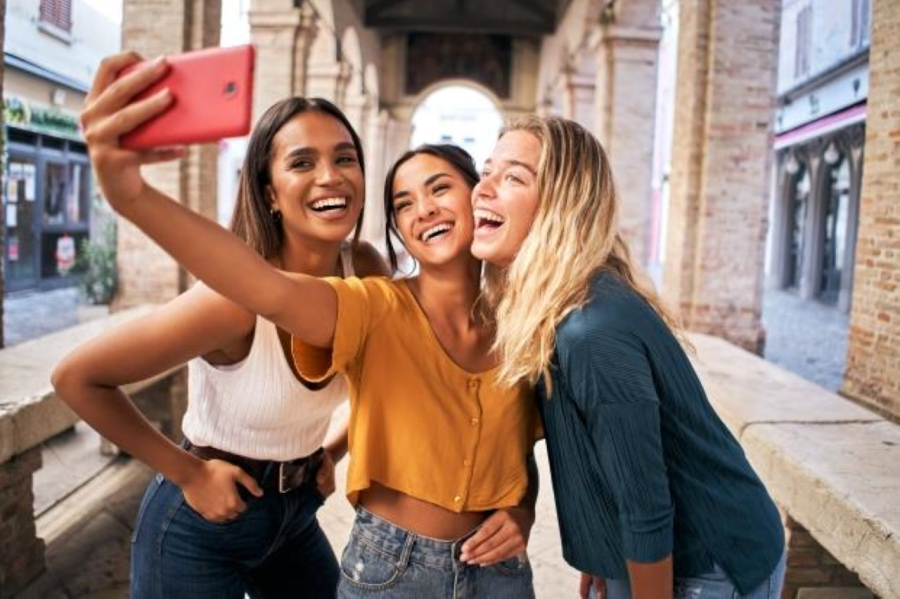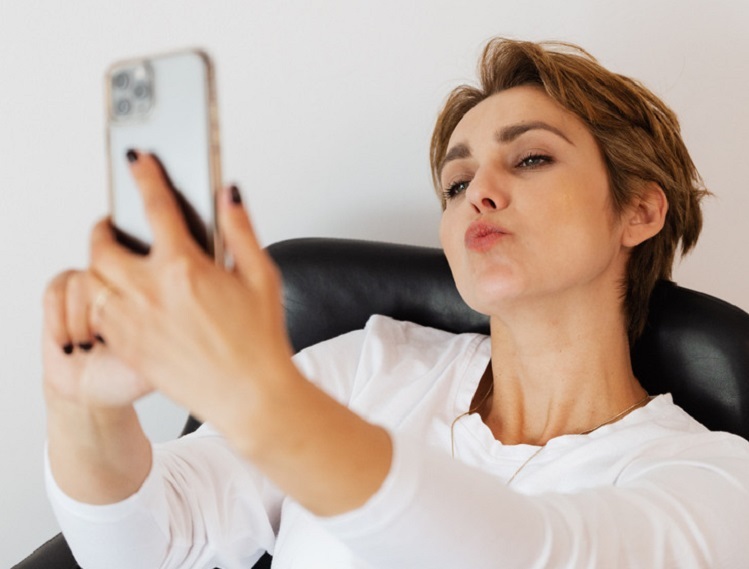According to Sputnik, selfies are usually taken by the users themselves using their phones, cameras, or webcams. The person taking the selfie can hold the device in their hand or use a selfie stick or tripod.
Selfies are often personal photos that reflect the personality and style of the person taking them. They can also capture memorable moments that are shared on social media platforms like Facebook, Twitter, Snapchat, and Instagram…
These selfies boost confidence and improve emotional well-being, helping to alleviate loneliness
A study conducted by experts at the University of Irvine in California found that taking selfies daily makes people happier.
According to the scientists, taking selfies boosts confidence and improves emotional well-being. In their experiments, the scientists worked with two groups of people. The first group had to take selfies at least three times a day and share them on social media. The second group, on the other hand, was prohibited from taking selfies.
After analyzing the results, the scientists found that the first group of volunteers had 30% higher levels of endorphins in their blood compared to the second group. The scientists explained that taking selfies can help people break free from loneliness and make their images more popular on social media.

Researchers say that selfies create happier memories than regular quick shots.
Taking selfies makes you happier
Researchers have found that selfies create happier memories than regular quick shots. They believe that including oneself in the photo evokes stronger emotions.
Showcasing how we look or feel at the moment of taking the selfie gives the photo a greater meaning.
These findings come from surveys in which people were asked whether they took photos to record meaningful experiences or moments and how satisfied they were with those photos.
Dr. Zachary Niese from the University of Tübingen in Germany said, “Sometimes there’s ridicule about taking pictures in popular culture. But personal photos have the ability to reconnect people with their past experiences.”
Professor Lisa Libby from Ohio State University added, “Photos with you in them capture a greater moment – it doesn’t have to be frivolous.”
Dr. Niese said that posting selfies on social media has more benefits than just showing off. He also stated, “It looks like people are curating images for themselves to look back on the experiences or the meaning of events they have had.”
There’s a useful tip when taking selfies – hold the camera above your chin. The reason for this is that if the camera is placed too low, the face will appear chubby. When you want to take a good selfie, hold the phone at eye level or, even better, use a selfie stick.
Remember not to try too hard to take a perfect photo. There’s no one best pose. The beauty of a selfie lies in its naturalness. If you still feel self-conscious, take a deep breath before taking the photo. You can also close your eyes before taking the photo and then open your mouth slightly and quickly press the capture button.
Maintaining a reasonable selfie habit helps you live a happier, healthier, and more well-rounded life than those who don’t take selfies
A selfie habit is self-care
According to Brightside, a study conducted by Dr. Liz Brewster (Lancaster University) and Dr. Andrew Cox (Sheffield University) in the UK recorded the photos participants took, the content they added, and how they interacted with others online over a two-month period.
The researchers found that taking daily photos improves mental health through self-care, community interaction, and potential reflection. According to the study, taking selfies helps people rest and be more mindful of their day.
One survey participant mentioned that their daily work is very stressful, and taking photos feels like a breath of fresh air, allowing them to experience something different.
For others, taking selfies gives them a sense of purpose and achievement. It encourages them to go out instead of just sitting with a cup of tea.
After a day of looking down or hunching over, taking a selfie can be good for their posture. “It also forces you to pause and smell a flower, look around for a beautiful scene or object to photograph”, one participant shared.

Selfies improve your mood
Improved mood
A group of researchers studied people who smiled and took selfies every day for several weeks. The results showed that even if the smile was fake, they still experienced a better mood.
“It makes me feel comfortable to think ‘this is probably what I’ll see for the rest of the day,” one person said.
Sharing selfies with friends or loved ones also creates happiness.
Increased confidence
Many people are unaware that regularly taking self-portraits can make them feel more satisfied and confident about their appearance and body.
A study published in the Journal of Social Psychological and Personality Science found that people who enjoy taking selfies perceive themselves as more attractive and likable than those who don’t enjoy taking them.
Having a moment in a day can also ward off boredom. “Over several days, I’ve felt more at ease taking photos of myself. If you’re comfortable with yourself, a selfie is going to be a way to capture that”, one participant in the study shared.
Another person mentioned that taking selfies every day makes them smile brighter and notice a less tense face.
Capturing beautiful moments and memories
Daily self-portraits can be a way to document personal growth. For example, someone who has gone through a personal crisis can reflect on how they have changed by looking back at a photo from that time.
They have witnessed how they slowly survived through dark days and even elements in the photo, such as light and color, also remind them of bright moments.
Nostalgia is also good for mental health, adding vibrancy. When looking back at happy memories through selfies, you have the chance to relive your own memories with friends and loved ones.
Maintaining social connections
Sharing self-portraits on social media helps some people discover connections, start conversations, and find support groups. For example, retirees find that posting photos and receiving interactive comments on their photos helps them connect with their former colleagues as if they were still working.
Others share their photos along with their pain with friends on social media. When they receive comfort and encouragement, they feel less sad and may even find healing.
If you find that your photos constantly receive unpleasant comments or lack interaction, it may be time to rethink your selfie-taking habits.





































